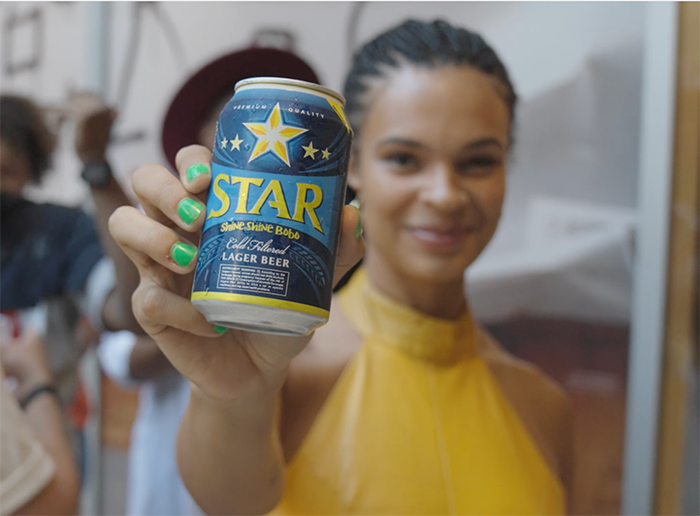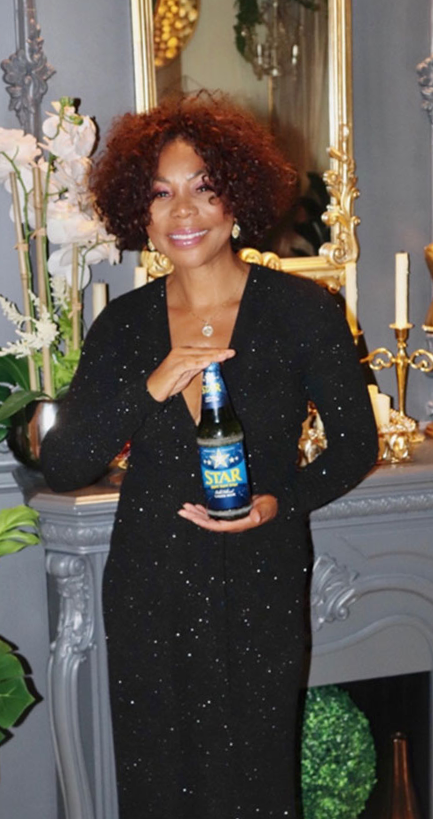By: Kate Bernot

The seed of Star Lager Beer USA was planted in, of all places, a funeral. In 2016, May Odiakosa returned to her home country of Nigeria following the death of her grandmother. At a party commemorating her grandmother’s 93 years of life, her cousin handed her a bottle of Star Beer. Odiakosa, a paralegal and trial specialist in California, hadn’t tasted that beer since she’d moved to the U.S. in 1988, and one sip of it brought back a flood of emotion and memories.
“At that moment, the beer tasted like gold to me after not drinking it for so long,” Odiakosa says. “And my cousin and my sister said, ‘You don’t have this in the States?’” It would take years, but in 2021 Odiakosa became the U.S. Importer for Star Beer, a storied lager brand that’s been brewed in Nigeria since 1949. Today, Star Beer is available in retailers in about a dozen states, including Maryland, Pennsylvania, Texas, and Florida. This spring, Star Beer also signed a deal with GoPuff for sales in Pennsylvania. Odiakosa and her son, Jordan, oversee the brand in the U.S., and have ambitious goals not only to grow Star Beer but to increase access to and appreciation of other African imports in the U.S.
“The biggest thing about all this is highlighting African excellence,” says Jordan Odiakosa. “It’s about allowing people to try products from Africa that they wouldn’t have ever heard of or considered.”
At a time when imported beer is the category’s leading subsegment, African brands have been notably absent from many U.S. shelves and tap lines. Drinkers can choose from plenty of Mexican imports, of course, but also those from Germany, the United Kingdom, the Netherlands, Australia, Japan, and Italy. Left out, often, is the entire African continent. The Odiakosas are changing that, one Star Beer at a time. The West African diaspora in the U.S. has received the brand eagerly and so have people who have traveled to or lived in that part of the continent. According to the Migration Policy Institute, Nigeria is the African country with the highest number of immigrants to the U.S.; the population of Nigerian-born immigrants in the U.S. has more than doubled between 2006 and 2023. Nigeria is also the sixth most populous country in the world. But Paul Violante, Brand Manager for Origlio Beverage & Maryland Distributing Partners, believes Star Beer’s appeal transcends those demographics.
“Our initial approach was to make sure we try to cover all the West African demographic centers… but we really want to make sure we get it everywhere,” Violante says. “It is a beer for everybody, and a lot of people respond well to the brand story.”
“Africans know how to celebrate, and this beer brings everybody together for celebration.”
– MAY ODIAKOSA, U.S. Importer for Star Beer
The beer itself is approachable and easy drinking, with a bit more body and bitterness than a standard American light lager. As Americans’ interest in imported beers grows, Odiakosa says Star Beer has found success with on-premise sampling. She says consumers react with curiosity and excitement to try, what is for most people, their first sip of a beer brewed in Africa.
“The product speaks for itself,” Odiakosa says. “Africans know how to celebrate, and this beer brings everybody together for celebration.”
Star Beer’s social media presence – headed by Jordan Odiakosa – reflects this diversity. The brand shows up in bottles, cans, and pint glasses, enjoyed by a range of people in varied settings from barbecues to hikes to street festivals. The brand aims to project effortless, adaptable fun that can be part of anyone’s good time, while also leaning into its West African cultural roots.
“When they try it and I see their reaction, it means that we’re doing our own part in bringing our culture and our product to Americans,” Odiakosa says. “And they’re curious about what else comes from Africa – what other foods, what other beers.”
As part of that mission, Odiakosa has also begun importing other African beer brands. She aspires to be the importer of a broad portfolio of African beers, prompting her to rebrand her business from Star Beer USA to African Beer USA. She is fond of reminding people that Africa is an entire continent, not a country, and home to roughly 20 percent of the world’s population. The fact that most Americans can’t find any beer from the continent is a shame.
It’s clear that Odiakosa’s business has always been deeply personal to her. It’s not just about selling beer or even just about spreading her culture – she also aims to save lives. Odiakosa lost her sister, Ngozi Okaka, to cervical cancer in 2019, and today, her company donates 5 percent of revenues to cervical cancer research in Okaka’s honor. In March, their efforts enabled 500 women to obtain cervical cancer screenings free of cost. Odiakosa says her sister’s legacy will forever be entwined with Star Beer, because Okaka was a huge supporter of bringing that beer to U.S. drinkers. Odiakosa says that even when her sister was sick, she was still pushing the business forward. Star Beer, she says, was Okaka’s dream.
“She believed in it from day one. She was not wavering, even when the [import] licensing process took so long, she believed in it more than I did,” Odiakosa says. “And she kept pushing.”
Odiakosa shares her sister’s tenacity. She and her son continue to run the business as a family affair, visiting accounts, attending consumer-facing events, and spreading the joy that Star Beer represents for so many people of Nigerian descent. Their hope is that Americans can share in their family, culture, and tradition – and make it their own.
“It’s Always a Yes”

The biggest challenge May Odiakosa says she faces in growing Star Beer’s U.S. presence is meeting retail decision makers.
“I went to meet the people from H-E-B (a Texas supermarket chain known for its customer service, extensive selection of grocery items, and unique brand identity), and it was amazing. After we spoke for 10 minutes, they’re like, ‘Okay, you are in.’ But getting to meet the people that make the decision at H-E-B was two and a half years in the making,” she says.
She’s found success in meeting retailers in person, rather than merely sending a brand deck, because it allows her personality and commitment to shine through more clearly.
“Until I am in front of people, it’s a challenge,” Odiakosa says. “But I don’t know how to take ‘no’ for an answer.”
About the Author: You may know her as the director of the North American Guild of Beer Writers, but Kate Bernot wears many hats. The work of this celebrated journalist and BJCP Certified Beer Judge routinely appears in The New York Times, Washington Post and the online publication Good Beer Hunting – to name a few. Ms. Bernot resides in Missoula, Montana where she enjoys the great outdoors and a good pint of beer made by the area’s skilled local brewers.
